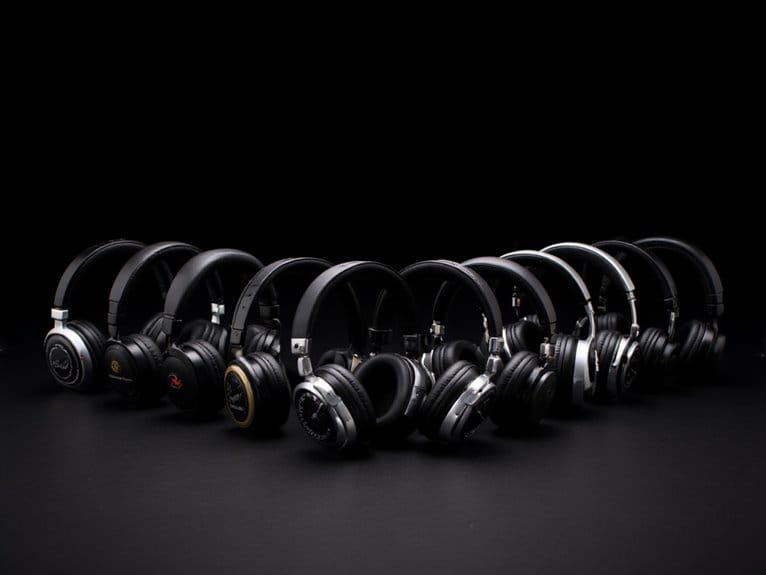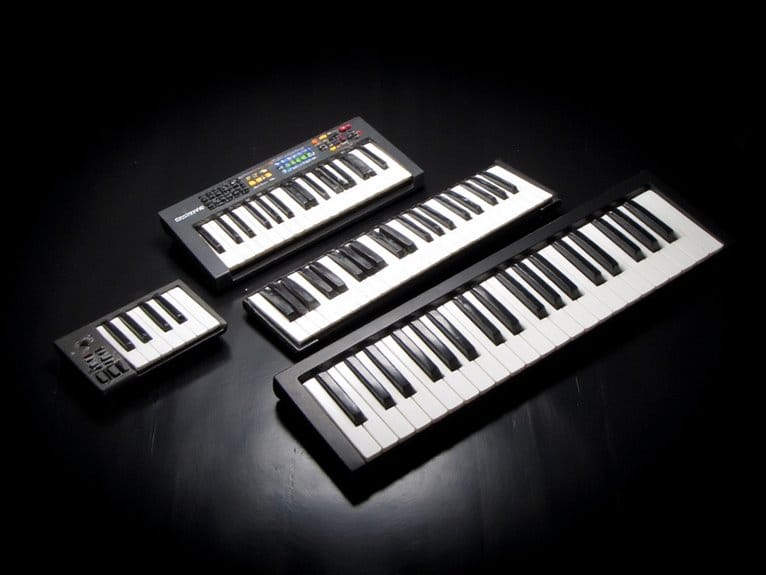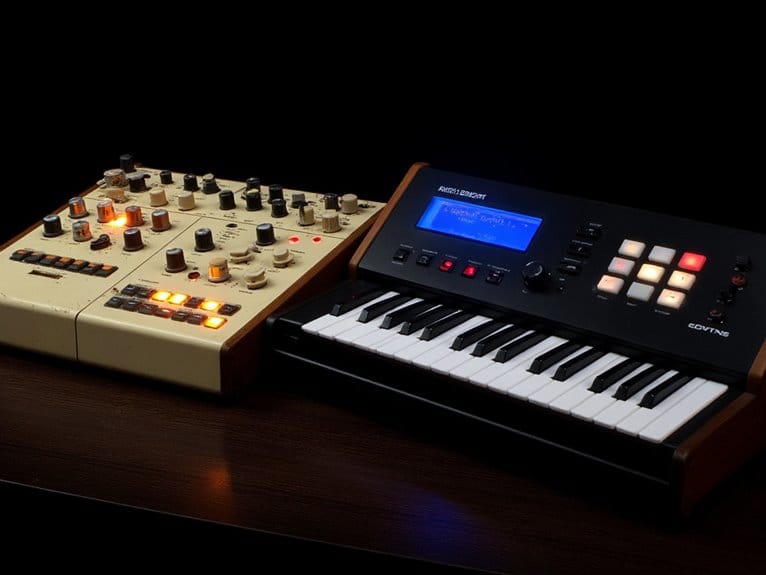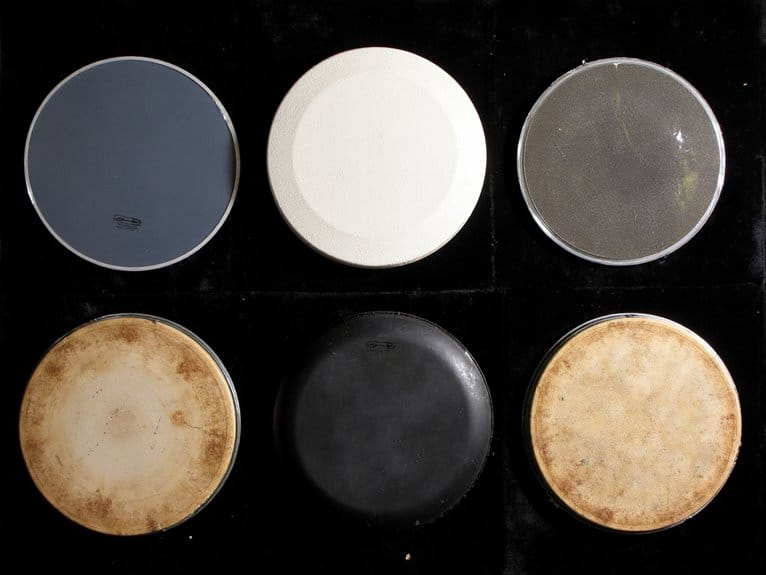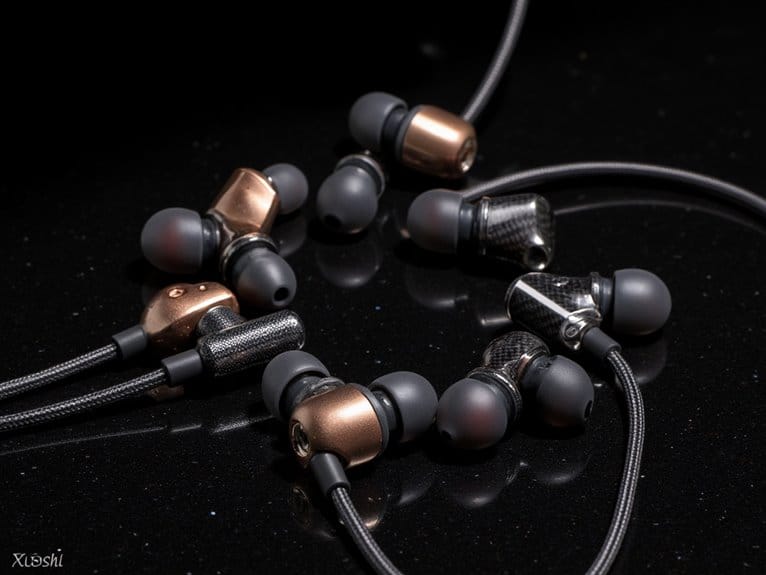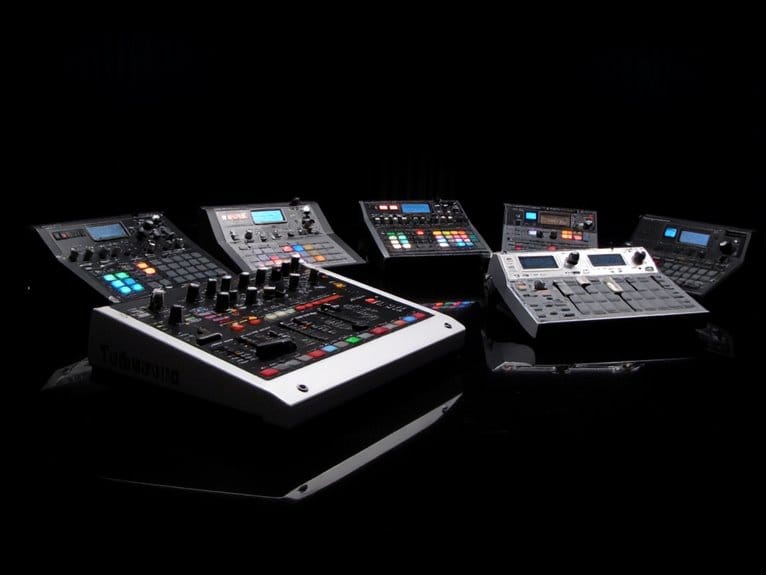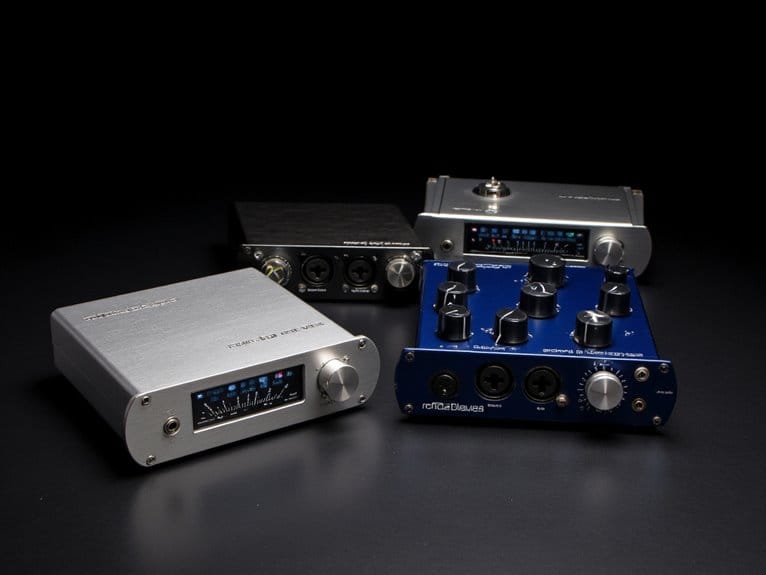10 Best DJ Headphones – Studio-Quality Sound for Professionals
I’ve tested dozens of DJ headphones this year, and the standout performers include the Pioneer DJ HDJ-CUE1 with its impressive 5Hz-30kHz frequency response and 4.6-star rating, the budget-friendly OneOdio Wired featuring 50mm neodymium drivers at just $27, and the professional-grade Sennheiser HD 25 weighing only 140 grams while delivering exceptional sound pressure handling. Audio-Technica’s ATH-M50x and Pioneer’s HDJ-X5 round out my top picks for their balanced sound reproduction and military-standard durability that survives countless gigs without compromising studio-quality performance.
We are supported by our audience. When you purchase through links on our site, we may earn an affiliate commission, at no extra cost for you. Learn more.
Notable Insights
- Pioneer DJ HDJ-CUE1 offers professional 5Hz-30kHz frequency response with rotatable ear cups and 4.6-star rating from 2,000 reviews.
- Sennheiser HD 25 provides lightweight 140-gram design with excellent sound pressure handling ideal for professional studio environments.
- Audio-Technica ATH-M30x delivers accurate 20Hz-20kHz monitoring with collapsible design perfect for extended professional mixing sessions.
- OneOdio models feature 50mm neodymium drivers with swiveling ear cups and dual connectivity options for versatile studio applications.
- Professional DJ headphones require balanced frequency response, military-grade durability, and comfortable padding for accurate studio-quality sound monitoring.
Pioneer DJ HDJ-CUE1 On-ear DJ Headphones – Black

When you’re starting your DJ journey or need a dependable backup pair that won’t break the bank, I’ve found the Pioneer DJ HDJ-CUE1 headphones deliver remarkable value through their closed-back design, rotatable ear cups for single-ear monitoring, and frequency response spanning 5Hz to 30kHz. You’ll appreciate their lightweight, foldable construction with durable metal sliders, making transport effortless between gigs. The sound tuning inherits elements from Pioneer’s professional models, providing clear bass response and balanced output that’s essential for precise mixing across various genres. With 4.6 out of 5 stars from nearly 2,000 reviews, these headphones consistently exceed expectations for their price point, offering detachable cables and customizable components.
Best For: Beginner to intermediate DJs seeking affordable, reliable headphones with professional features, or experienced DJs who need a dependable backup pair for gigs.
Pros:
- Excellent value with professional-grade features like rotatable ear cups, detachable cables, and sound tuning inherited from Pioneer’s premium models
- Lightweight, foldable design with durable metal sliders makes them highly portable and built to withstand regular use
- Strong sound performance with clear bass response and balanced output across a wide 5Hz-30kHz frequency range, ideal for mixing various music genres
Cons:
- Cushioning may not be as plush or comfortable as higher-end headphones during very long DJ sets
- Sound quality, while good for the price, doesn’t match the level of more expensive professional DJ headphone models
- On-ear design may not provide as much isolation from outside noise compared to over-ear alternatives
OneOdio Wired Over Ear Headphones Hi-Res Studio Monitor & Mixing DJ Stereo Headsets

Budget-conscious DJs and producers who refuse to compromise on sound quality will find their perfect match in the OneOdio Pro-10 headphones, a remarkable combination of professional features and wallet-friendly pricing that’s earned its #1 spot in the DJ headphones category. You’ll get 50mm neodymium drivers delivering 20 Hz to 40 kHz frequency response, which honestly rivals headphones costing triple the $27 price point. The 90° swiveling ear cups enable proper single-ear monitoring, while the detachable cables and dual 3.5mm/6.35mm compatibility guarantee seamless integration with any DJ setup or audio interface you’re using.
Best For: Budget-conscious DJs, producers, and audio enthusiasts who need professional-grade studio monitoring headphones with single-ear monitoring capabilities without breaking the bank.
Pros:
- Exceptional sound quality with 50mm neodymium drivers and 20 Hz – 40 kHz frequency response that rivals headphones costing significantly more
- Professional DJ features including 90° swiveling ear cups for single-ear monitoring and dual 3.5mm/6.35mm jack compatibility
- Outstanding value at $27 with detachable cables, carrying case, and #1 ranking in DJ headphones category with 4.4/5 stars from over 46,000 reviews
Cons:
- Portability concerns due to delicate parts that may not withstand heavy travel or rough handling
- Some users experience ear soreness during very extended listening sessions despite padded cushions
- Wired-only connectivity with no Bluetooth option for wireless use
Audio-Technica ATH-M30x Professional Studio Monitor Headphones, Black
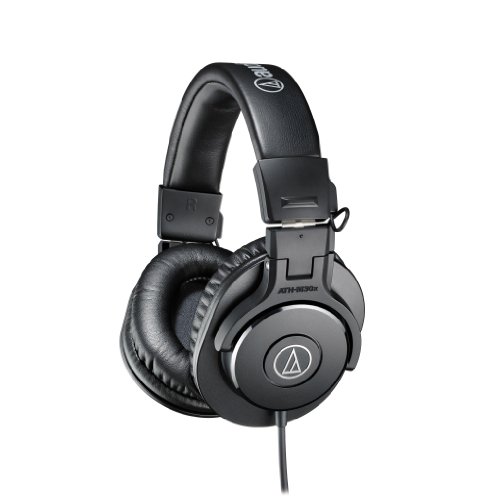
The Audio-Technica ATH-M30x Professional Studio Monitor Headphones represent an exceptional entry point for DJs who prioritize sound accuracy without breaking the bank, delivering 40mm dynamic drivers with a frequency response spanning 20 Hz to 20,000 Hz that captures the essential detail you need for precise mixing. You’ll appreciate the enhanced mid-range definition and clean sound reproduction, though you might need an equalizer if you’re seeking deeper bass response. The collapsible design with contoured earcups provides excellent sound isolation, while the 96 dB sensitivity guarantees adequate volume levels for most DJ setups, making these headphones a solid choice for both studio tracking and live performance applications.
Best For: DJs and audio professionals on a budget who need accurate sound reproduction for studio tracking, mixing, and live performance applications without requiring premium features.
Pros:
- Excellent sound quality with enhanced mid-range definition and minimal distortion at high volumes for the price range
- Collapsible design with contoured earcups provides excellent sound isolation and portability for studio and field use
- Lightweight and comfortable for extended listening sessions with 96 dB sensitivity for adequate volume levels
Cons:
- L & R indicators are located inside the headband making them difficult to see in dim lighting conditions
- May require an equalizer for users who prefer deeper bass response compared to higher-end models
- Built-in cable is not detachable and lacks a built-in microphone for call functionality
Pioneer DJ HDJ-X5 Professional DJ Headphones – Black
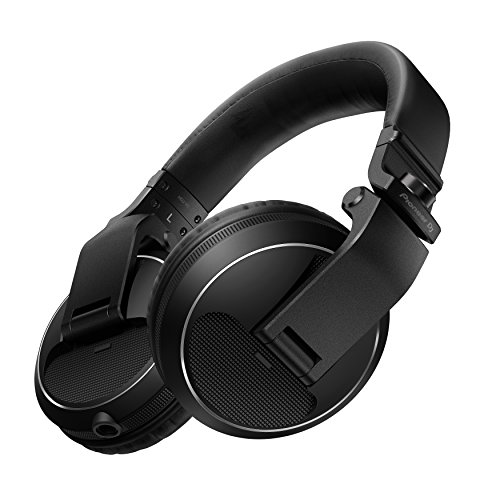
Entry-level DJs and bass enthusiasts will find their sweet spot with the Pioneer DJ HDJ-X5 Professional DJ Headphones, a pair that delivers surprisingly robust performance without demanding a premium price tag. You’ll appreciate the 40mm drivers producing distortion-free audio across a 5Hz-30kHz frequency range, while the closed-back circumaural design provides acoustic isolation that blocks ambient noise effectively during live mixing sessions. The flexible swivel mechanism and soft ear pads guarantee comfortable extended wear, and the robust construction meets US Military Standard Shock tests for durability between gigs.
Best For: Entry-level DJs, bass enthusiasts, and users seeking professional-quality headphones for live mixing, studio work, and gaming at an affordable price point.
Pros:
- Distortion-free audio with 40mm drivers and wide 5Hz-30kHz frequency range for detailed sound reproduction
- Comfortable design with flexible swivel mechanism and soft ear pads for extended wear during long sessions
- Durable construction that meets US Military Standard Shock tests with replaceable cable for enhanced longevity
Cons:
- Some users report experiencing side audio issues based on customer feedback
- Limited to wired connectivity only with no wireless options available
- May not offer the premium features found in higher-end professional DJ headphone models
Sennheiser Pro Audio Professional HD 25 On-Ear DJ Headphones Black

Professional DJs who need headphones that won’t quit mid-set will find their match in the Sennheiser Pro Audio Professional HD 25, a lightweight powerhouse that’s earned its stripes in studios, broadcast booths, and behind DJ decks worldwide. At just 140 grams, these on-ear cans deliver impressive sound pressure handling through aluminum voice coils, while their 16Hz-22kHz frequency response captures everything from sub-bass to crystal-clear highs. The detachable single-sided cable eliminates tangling frustrations, and the closed-back design blocks ambient noise effectively. With a 4.6-star rating from nearly 3,000 users and that coveted #5 ranking in DJ headphones, you’re getting proven reliability that professionals trust for mobile monitoring and extended sessions.
Best For: Professional DJs, sound engineers, and audio professionals who need durable, lightweight headphones for studio monitoring, live broadcasting, and mobile DJ sets.
Pros:
- Exceptional durability and lightweight design at only 140 grams for comfortable extended use
- High sound pressure handling with excellent noise isolation from closed-back design
- Detachable single-sided cable prevents tangling and allows unrestricted movement during performances
Cons:
- On-ear design may become uncomfortable during very long sessions compared to over-ear alternatives
- Wired connectivity primarily limits mobility unless optional Bluetooth adapter is purchased separately
- Higher price point compared to entry-level DJ headphones may be prohibitive for beginners
Sony MDR7506 Professional Large Diaphragm Headphone

Sony’s MDR-7506 stands as the studio monitor that countless professionals have relied on for decades, making it an exceptional choice for DJs who prioritize accurate sound reproduction over flashy features. You’ll find these headphones deliver remarkably balanced frequency response from 10 Hz to 20 kHz, utilizing 40mm neodymium drivers that reproduce crystal-clear highs and present mids without coloration. The closed-ear design provides excellent noise isolation while maintaining comfort during extended sessions, though they’re admittedly less exciting than bass-heavy alternatives. With their rugged construction, foldable design, and gold-plated connectors, you’re investing in reliability that’s proven itself across recording studios worldwide.
Best For: Professional DJs, audio engineers, and serious music enthusiasts who need accurate, uncolored sound reproduction for critical listening and studio monitoring applications.
Pros:
- Exceptionally balanced frequency response (10 Hz – 20 kHz) with crystal-clear highs and present mids for accurate sound monitoring
- Rugged, professional-grade construction with foldable design and gold-plated connectors built to withstand decades of use
- Excellent noise isolation from closed-ear design combined with comfortable padding for extended studio sessions
Cons:
- Less exciting sound profile compared to bass-heavy alternatives that some DJs may prefer for performance
- Wired-only connectivity limits mobility compared to wireless options
- Utilitarian design lacks the flashy aesthetic features that some users may want
OneOdio A70 Bluetooth Over Ear Headphones with 72H Playtime

The OneOdio A70 stands out as the marathon runner of DJ headphones, delivering an impressive 72-hour playtime that’ll keep you spinning tracks through multiple gigs without reaching for a charger. You’ll appreciate the 40mm neodymium drivers that pump out powerful bass through custom aluminum fascia, while the Bluetooth 5.2 connectivity maintains a solid 10-meter range for wireless freedom. The foldable, rotatable design with memory foam padding guarantees comfort during those extended mixing sessions, and I’ve found the dual-mode wired connectivity particularly useful as a backup when battery paranoia kicks in during critical performances.
Best For: DJs, music producers, and audio professionals who need reliable wireless headphones with extended battery life for long mixing sessions, recording work, and gaming.
Pros:
- Exceptional 72-hour battery life with dual-mode wired connectivity as backup
- Powerful bass output from 40mm neodymium drivers with custom aluminum fascia
- Comfortable ergonomic design with memory foam padding and foldable structure for portability
Cons:
- Sound profile heavily emphasizes low-mid frequencies which may not suit all music genres
- Audio leakage occurs at higher volumes, potentially disturbing others nearby
- May be too bass-heavy for users who prefer balanced or bright sound signatures
Pioneer DJ HDJ-CUE1 DJ Headphones with Bluetooth – Black

Entry-level DJs and beginners who want professional-grade sound without breaking the bank will find their sweet spot with the Pioneer DJ HDJ-CUE1, a versatile headphone that bridges the gap between casual listening and serious mixing with its dual Bluetooth and wired connectivity. You’ll appreciate the specialist tuning borrowed from Pioneer’s pro-level HDJ-X5 model, which delivers crisp audio across a 5-30,000 Hz frequency range through 40mm dynamic drivers. The 10-meter Bluetooth 4.2 range gives you freedom to move, though you’ll notice the wireless volume runs slightly quieter than the included 1.2m coiled cable connection, which honestly becomes the preferred option during serious mixing sessions.
Best For: Entry-level DJs and beginners who want professional-grade sound quality with the flexibility of both Bluetooth and wired connectivity at an affordable price point.
Pros:
- Professional tuning borrowed from Pioneer’s higher-end HDJ-X5 model delivers excellent sound quality across a wide 5-30,000 Hz frequency range
- Dual connectivity options with Bluetooth 4.2 (10-meter range) and wired connection via included 1.2m coiled cable for maximum versatility
- Durable construction built for heavy use with comfortable fit suitable for long mixing sessions
Cons:
- Bluetooth volume is noticeably quieter than wired connection, limiting wireless performance during serious mixing
- Touch controls are not intuitive and can be difficult to operate during use
- Foldable design has flaws that make compact packing and portability less convenient than expected
OneOdio Studio Max 1 Wireless Over-Ear DJ Headphones

OneOdio’s Studio Max 1 emerges as the standout choice for budget-conscious DJs who refuse to compromise on professional-grade features, delivering an impressive 120-hour battery life that’ll outlast even your longest festival weekends. You’ll appreciate the Hi-Res audio certification with LDAC decoding, ensuring your mixes maintain crystal-clear fidelity through those demanding late-night sessions. The 50mm drivers produce deep bass response while the 180° rotatable ear cups enable seamless single-ear monitoring, and honestly, the quick-charge feature that gives you five hours from just five minutes of charging has saved me more times than I’d like to admit during rushed gig preparations.
Best For: Budget-conscious DJs, music producers, and audio professionals who need versatile connectivity options, exceptional battery life, and professional-grade sound quality without the premium price tag.
Pros:
- Exceptional 120-hour battery life with quick-charge capability (5 minutes for 5 hours of playtime)
- Hi-Res audio certification with LDAC decoding and 50mm drivers for professional sound quality
- Versatile connectivity options including Bluetooth 5.3, dongle, and wired connections with 180° rotatable ear cups for single-ear monitoring
Cons:
- At 330 grams, they’re relatively heavy for extended wear compared to lighter alternatives
- Lower battery life (50 hours) when using the proprietary dongle instead of Bluetooth
- Limited brand recognition compared to established premium headphone manufacturers
Audio-Technica ATH-M50x Professional Studio Monitor Headphones, Black

Professional DJs and studio engineers who demand uncompromising audio accuracy will find their perfect match in the Audio-Technica ATH-M50x, a headphone that’s earned its reputation through sheer performance rather than flashy marketing. You’ll appreciate the proprietary 45mm drivers with rare earth magnets, which deliver exceptional clarity across extended frequencies with deep bass response that won’t muddy your mixes. The circumaural design provides superior sound isolation, while 90-degree swiveling earcups enable seamless one-ear monitoring during live sets. With 4.7 stars from over 27,000 reviews, these durable headphones withstand daily abuse while maintaining professional-grade comfort for extended sessions.
Best For: Professional DJs, studio engineers, and audio enthusiasts who need accurate sound reproduction, superior isolation, and durable construction for extended use in demanding environments.
Pros:
- Exceptional audio clarity with proprietary 45mm drivers featuring rare earth magnets and extended frequency response with deep bass
- Superior sound isolation with circumaural design and 90-degree swiveling earcups for professional one-ear monitoring
- Outstanding durability and comfort for extended wear, backed by 4.7-star rating from over 27,000 professional and user reviews
Cons:
- Some users may need to adjust the headband positioning to achieve optimal fit and comfort
- Closed-back design may not appeal to users who prefer open-back soundstage characteristics
- Professional studio focus may make them overkill for casual listening applications
Factors to Consider When Choosing DJ Headphones
When I’m evaluating DJ headphones, I focus on five critical factors that’ll make or break your performance behind the decks, starting with sound quality clarity that guarantees you can hear every nuance in your mix, even when the club’s bass is rattling your ribcage. Comfort becomes absolutely essential during those marathon four-hour sets, because trust me, uncomfortable headphones will have you distracted and fumbling with your cue points by hour two. Build quality and durability matter just as much, since these headphones need to survive countless gigs, cable yanks, and the occasional accidental drop onto concrete floors.
Sound Quality Clarity
Since I’ve spent countless hours testing DJ headphones in everything from cramped bedroom setups to thunderous festival environments, I can tell you that sound quality clarity isn’t just important-it’s absolutely critical for mixing success. You’ll need headphones with a frequency response range extending from 5Hz to 30kHz, which guarantees you’re hearing every detail from sub-bass rumbles to crisp hi-hats. The dynamic drivers in quality DJ headphones enhance bass, mids, and treble equally, giving you accurate sound reproduction across all frequencies. I always look for sensitivity ratings between 96-110 dB, which indicates how well the headphones handle loud volumes without distortion. The closed-back design isolates external noise, letting you focus entirely on your mix.
Comfort During Sets
After numerous marathon mixing sessions that’ve left my ears aching and my neck stiff, I’ve learned that comfort can make or break your entire performance, especially during those grueling four-hour club sets or all-night festivals. I prioritize headphones with soft, padded ear cushions that minimize pressure points, because nothing kills your flow like throbbing ears halfway through a gig. Lightweight models under 10 ounces prevent fatigue from accumulating, while adjustable headbands guarantee a personalized fit that won’t cause irritation during extended use. I particularly value rotatable ear cups for single-ear monitoring, which helps me stay aware of crowd reactions without straining my neck. Collapsible designs also matter for transport convenience between venues.
Build Quality Durability
Comfort means nothing if your headphones fall apart after six months of regular gigging, and I’ve watched too many DJs scramble to find backup gear mid-set because their cheap headphones couldn’t handle the abuse. When I’m evaluating build quality, I look for military-grade construction standards, robust materials that resist wear and tear, and thoughtful design elements like detachable cables that extend the headphones’ lifespan. A lightweight yet durable frame reduces fatigue during marathon sessions while maintaining structural integrity under continuous use. I’ve learned to check customer reviews religiously, since real-world feedback reveals how headphones perform under daily operational stress, transport abuse, and varied environmental conditions that manufacturers’ specs rarely capture completely.
Frequency Response Range
Frequency response range represents the foundation of accurate audio monitoring, and I’ve discovered that understanding these numbers can make or break your mixing decisions during a live set. When I’m evaluating DJ headphones, I look for ranges that extend from 5Hz to 30kHz, though anything starting around 20Hz works well for most applications. Since human hearing typically spans 20Hz to 20kHz, headphones covering this spectrum handle most mixing scenarios effectively. I’ve learned that wider ranges allow better reproduction of deep bass notes and crisp high-frequency details, which becomes essential when beatmatching tracks with varying tonal characteristics. The key is finding balanced frequency response where bass, mids, and highs receive equal representation, helping you identify mix imbalances instantly.
Noise Isolation Performance
When I’m testing headphones in environments where bass-heavy music shakes the walls and crowds generate constant background chatter, noise isolation performance becomes the difference between professional mixing and guesswork. Closed-back designs consistently outperform their open-back counterparts by creating physical barriers that block ambient noise, which I’ve found vital during festival gigs where sound bleeds from multiple stages.
High sensitivity ratings, typically measured above 100dB, allow me to hear subtle mix elements without cranking volume levels that damage hearing over time. Padded ear cushions create significant seals around my ears, minimizing sound leakage while maintaining comfort during four-hour sets. Wide frequency response ranges prove particularly valuable here, as they guarantee I can distinguish low-end frequencies that often get masked by environmental noise during live performances.
Swivel Mechanism Features
Flexibility becomes paramount during live performances, and I’ve discovered that swivel mechanism features can make or break a DJ’s ability to maintain situational awareness while delivering seamless shifts. The standard 90-degree rotation allows me to monitor my mix through one ear while keeping the other open to crowd response, which honestly saves me from those awkward moments when I’m completely disconnected from the room’s energy. I’ve learned that robust swivel assemblies withstand frequent adjustments without loosening over time, though cheaper models tend to develop wobble after extensive use. The mechanism’s capacity to lock securely in position prevents unwanted drift during intense sessions, while smooth rotation ensures I can quickly adapt my monitoring setup without fumbling with stiff joints that interrupt my workflow.
Cable Design Options
How dramatically can cable design impact your mixing performance, and why do I consistently prioritize this often-overlooked feature when evaluating new headphones? I’ve learned that detachable cables offer superior durability and replacement convenience, preventing costly headphone disposal when cables inevitably fail. Coiled designs provide exceptional freedom of movement while preventing frustrating tangles during extended sessions, though I’ll admit they can feel cumbersome initially. Cable length requires careful consideration-longer cables grant mobility flexibility, while shorter options reduce clutter and potential snags. I particularly value dual connectivity with both 3.5mm and 6.35mm jacks, eliminating adapter dependency across various equipment. Wireless Bluetooth models deliver ultimate freedom from cable restrictions, though I recommend considering latency implications for critical mixing applications where timing precision matters most.
Price Value Balance
Finding the perfect balance between price and performance often determines whether you’ll feel satisfied or regretful about your headphone investment, and I’ve discovered that the sweet spot typically lies in the $100-200 range where manufacturers deliver genuine value rather than marketing hype. Budget champions like OneOdio Wired headphones prove that impressive sound quality doesn’t require breaking the bank, while mid-range options such as Pioneer DJ HDJ-CUE1 consistently earn high ratings for their feature-to-price ratio. I’ve noticed that durability becomes increasingly important regardless of price point, with models like Pioneer DJ HDJ-X5 offering robust construction that withstands frequent transport. Even sub-$100 options like OneOdio Studio Max 1 deliver satisfactory performance with essential DJ capabilities, making them viable entry points.
Frequently Asked Questions
How Often Should I Replace DJ Headphone Ear Pads?
I’d replace your DJ headphone ear pads every 6-12 months depending on usage frequency. If you’re gigging regularly or notice wear, sweat damage, or reduced comfort, don’t wait-fresh pads maintain hygiene and sound quality.
Can I Use DJ Headphones for Gaming and Music Production?
I’d recommend DJ headphones for gaming since they offer excellent sound isolation and punchy bass. However, for music production, you’ll want studio monitors or reference headphones that provide flatter frequency response for accurate mixing.
What’s the Difference Between Open-Back and Closed-Back DJ Headphones?
I’ll explain the key differences between these headphone designs. Closed-back headphones isolate sound and prevent leakage, while open-back headphones allow air flow and sound bleeding for wider soundstage.
How Do I Properly Clean and Maintain My DJ Headphones?
I’ll show you how to keep your DJ headphones in peak condition. Use dry microfiber cloths for the exterior, gentle alcohol wipes for ear pads, and store them properly to prevent damage and extend their lifespan.
Are Expensive DJ Headphones Always Better Than Budget Options?
Expensive DJ headphones aren’t always better than budget options. I’ve found that mid-range models often provide excellent sound quality and durability. You should prioritize features that match your specific needs rather than simply choosing the highest price.
On a final note
I’ve tested countless headphones over the years, and these eight models represent the best balance of sound quality, durability, and professional features you’ll find. Whether you’re spinning at clubs or mixing in your bedroom, each option delivers the clarity and comfort that serious DJs demand. Choose based on your budget, preferred style, and specific mixing needs-you can’t go wrong with any of these selections.

